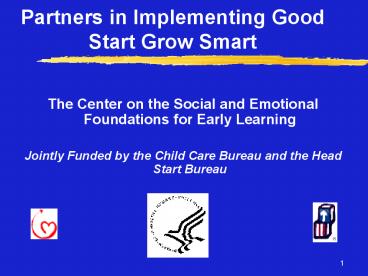Partners in Implementing Good Start Grow Smart - PowerPoint PPT Presentation
Title:
Partners in Implementing Good Start Grow Smart
Description:
1. Partners in Implementing Good Start Grow Smart. The Center on the Social and Emotional Foundations for Early Learning ... Amy Santos - Micki Ostrosky ... – PowerPoint PPT presentation
Number of Views:72
Avg rating:3.0/5.0
Title: Partners in Implementing Good Start Grow Smart
1
Partners in Implementing Good Start Grow Smart
- The Center on the Social and Emotional
Foundations for Early Learning - Jointly Funded by the Child Care Bureau and the
Head Start Bureau
2
Social Emotional Development as a Foundation for
School Life Success
- Some key indicators of school readiness that are
linked to social emotional development - Persistence at difficult tasks
- Ability to express emotions appropriately
- Ability to make and sustain relationships with
peers and adults - Confidence
- Ability negotiate and cooperate in a group
setting - When children dont have these skills, they are
less likely to benefit from even the best
instruction and they are more likely to engage in
challenging behavior - What we know about social development in
preschool and childrens later life success
3
Center Collaborators
- University of Illinois University of Colorado
at Denver - Mary Louise Hemmeter PI
- Phil Strain Co-PI- Rob Corso
- Barbara Smith - Amy Santos- Micki
Ostrosky- Tweety Yates University of
South Florida Education Development Center -
Glen Dunlap - Philip Printz - Lise Fox
University of Connecticut Tennessee Voices
for Children- Mary Beth Bruder - Matt
Timm- Nancy Gordon - Diane Dixon Project
OfficersAnn Linehan Head Start Linda
Reese-Smith Child Care
4
CSEFEL Goal
- To Strengthen the Capacity of Head Start and
Child Care to Promote the Social and Emotional
Foundations of Early Learning
5
Outcomes
- Increased awareness about the importance of
social/emotional development - Increased capacity of T/TA systems to support the
use of evidence-based practices at the local
level - Increased support for T/TA providers and direct
service providers through professional
organizations, institutions of higher education
and federal offices - Local demonstration sites
- Materials and products for a range of audiences
- Network of experts on social and emotional
foundations of learning - Positive outcomes for children and families!!!
6
Guiding Principles
- Promotion and Prevention
- Comprehensiveness
- Intensity
- Clear criteria for efficacy
- Cost and time efficiency
- Long term essential outcomes
- Family-centeredness
- Cultural and linguistic sensitivity
- Collaboration with and responsiveness to
consumers
7
Identify Evidence-Based Practices
- Topical Areas
- Positive parenting practices
- Classroom practices
- Social emotional curriculum and intervention
practices - Intensive child and family interventions
- Policy, leadership and systems change
- Culturally and linguistically sensitive practices
8
Identify Evidence-Based Practices
- What Works briefs on the following topics
- Understanding the impact of language differences
on behavior - Helping children understand routines and
classroom rules - Helping children make transitions between
activities - Using classroom activities and routines to
support peer interaction - Using environmental strategies to promote
positive peer interactions - Examples of Upcoming Briefs
- Helping children learn to manage their own
behavior - Strategies for teaching children about emotions
- Promoting positive peer social interactions
- Promoting emotional literacy
- Using social emotional curricula
9
Develop T/TA Materials
- Conduct focus groups needs, preferences,
strategies - Develop training materials
- Training modules
- Videos
10
Building a Foundation for Children
Individually Designed Interventions
Curriculum Strategies and Proactive Approaches
Supportive Learning Environments
Positive Relationships with Families, Children,
and Colleagues
11
Training Modules
- Classroom Preventive Practices/Building
Relationships - Social Emotional Teaching Practices
- Individualized Interventions for Challenging
Behaviors (2) - Leadership and Administrative Supports
- Power of Change (Coming Soon!!!!)
- Positive Parenting (Coming Soon!!!!)
12
Activities for Capacity Building
- Conduct national level dissemination activities
- Conduct strategic planning with state Head Start
and Child Care Teams - Establish demonstration sites at the local level
through the use of Partners in Excellence (PIE)
Teams
13
Disseminate Information and Materials
- Develop linkages with professional organizations
- DEC
- NAEYC
- NACCRRA
- NBCDI
- NABE
- Create an interactive Web site
- Disseminate content and materials to 2- and
4-year colleges and universities
14
Disseminating Evidence Based Practices
- Importance of understanding audience - families,
policy makers, direct service staff,
administrators - Determine level of impact - awareness vs change
in practice - Match format and content of materials to audience
- Provide training and build supports - ongoing
support is necessary for sustaining change over
time - Identify and address barriers
- Ensure that a common message is being provided to
all stakeholders - direct service staff,
administrative, policy, family
15
Building Community Capacity around Childrens
Mental Health
16
Collaborating with Mental Health Professionals
- Recognize the need for comprehensive, team-based
services that go beyond the early care and
education setting - Acknowledge the expertise of all team members
including the family - Build on the expertise of each team member in
order to effectively address challenging behavior - Collect information on relationships,
environments, teaching strategies the needs of
the child family - Develop a plan that addresses the long term needs
of children and families as well as the short
term needs of the early care and education staff
17
- For more information, visit our Web site at
http//csefel.uiuc.edu or contact - Dr. Mary Louise Hemmeter or
- Dr. Rob Corso
- at 61 Childrens Research Center51 Gerty
DriveChampaign, IL 61820































